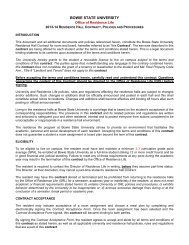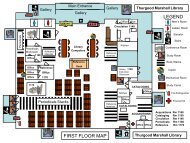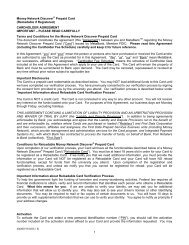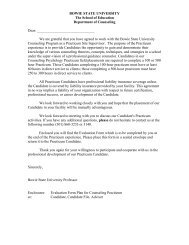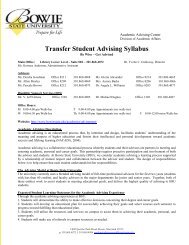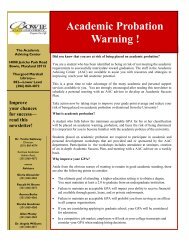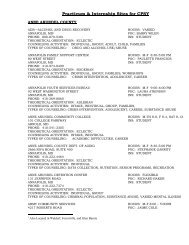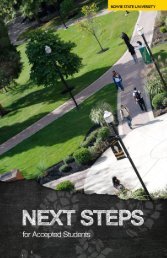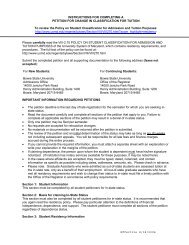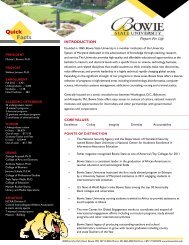2009-2010 - Bowie State University
2009-2010 - Bowie State University
2009-2010 - Bowie State University
You also want an ePaper? Increase the reach of your titles
YUMPU automatically turns print PDFs into web optimized ePapers that Google loves.
education, and community facilities. This course requires a field placement, regular reports, readings, and periodic meetings with the<br />
Practicum Director.<br />
SOCI 407 RURAL SOCIOLOGY (Spring Only) 3 CREDITS<br />
This course is an analysis of the rural segment of our society and examines changes of rural society in relationship to the development of urban<br />
areas.<br />
SOCI 408 COLLECTIVE BEHAVIOR (Fall Only) 3 CREDITS<br />
This course is a study of the nature and dynamics of group interaction settings in which mobs, crowds, fads, social movements, public opinion,<br />
propaganda, and revolutions. Various types of disasters are also included. Special attention is given to current social movements, including<br />
revolutions throughout the world.<br />
SOCI 409 URBAN PROBLEMS (Fall, Spring) 3 CREDITS<br />
This course is an overview of the history of and major social problems in the urban community, as well as the impact of public policies on urban<br />
life.<br />
SOCI 410 GROUP DYNAMICS 3 CREDITS<br />
SOCI 412 METH OF SOC RESEARCH (Fall, Spring) 3 CREDITS<br />
Prerequisite(s): SOCI 309. This course is a systematic study of the techniques and methods of sociological research, with emphasis on a critical<br />
analysis of the selection, formulation, and execution of research projects. Covers various modes of data collection and analysis.<br />
SOCI 413 DATA ANALYSIS IN SOCOIOLOGY (Fall, Spring) 3 CREDITS<br />
Prerequisite(s): SOCI 309 and SOCI 412. This is computer‐based course which builds on the skills and techniques learned in the elementary<br />
statistics and research methods courses. Bivariate and multivariate analysis of data is included. Students learn to work with the Statistical<br />
Package for the Social Sciences (SPSS) and/or other analytic programs.<br />
SOWK: SOCIAL WORK COURSE DESCRIPTIONS<br />
SOWK 200 INTRODUCTION TO THE PROFESSION OF SOCIAL WORK (Fall, Spring) 3 CREDITS<br />
This course is designed to furnish the student with a broad understanding of the knowledge, skill, and value base of the profession. The<br />
developmental aspects and current trends in social work will be explored.<br />
SOWK 201 SOCIAL WELFARE POLICY I (FALL ONLY) 3 CREDITS<br />
Prerequisite(s): SOWK 200. This course is a study of the historical development of the American social welfare system. Includes an exploration<br />
of the values and attitudes of society, as well as the political and the bureaucratic system that channels the operational growth and<br />
development of social welfare programs.<br />
SOWK 202 SOCIAL WELFARE POLICY II (SPRING ONLY) 3 CREDITS<br />
Prerequisite(s): SOWK 201. This course provides an assessment of policy as it directly affects service delivery. Examines the responsibilities<br />
and roles of a generalist worker in policy development, policy clarification, and change in policy implementation. A conceptual as well as<br />
analytic framework is presented for the understanding and analysis of social welfare policy. Further, resource allocation as it relates to policy,<br />
planning, and service delivery is presented.<br />
SOWK 208 INTRODUCTION TO FIELD OBSERVATIONS 3 CREDITS<br />
AND EXPERIENCES (FALL ONLY)<br />
Prerequisite(s): SOWK 200. This course is designed to offer students an opportunity to enhance their knowledge of their roles as helpers and<br />
service‐giving instruments. As participant observers, students will gain exposure that will assist them as they prepare for entry in the required<br />
field experience courses.<br />
SOWK 300 STAGES OF DEVELOPMENT (Fall, Spring) 3 CREDITS<br />
(SPRING ONLY)<br />
Prerequisite(s): EDUC 201. This course is an examination of development as a lifelong process. Theories of development, developmental<br />
methodology, and idiographic approaches to adult development are pursued. The course is limited to the period from early adulthood to<br />
death, with emphasis on interaction between the changing person and the changing environment.<br />
SOWK 301 HUMAN BEHAVIOR AND THE SOCIAL ENVIRONMENT 3 CREDITS<br />
Prerequisite(s): EDUC 201 and SOWK 300. This course is designed to equip students with a basic understanding of the growth, development,<br />
and behavior of the adult individual. Special emphasis is placed on examining growth, behavior, and the environment from a systems<br />
perspective.<br />
SOWK 302 SOCIAL WORK RESEARCH (SPRING ONLY) 3 CREDITS<br />
Prerequisite(s): PSYC 204 or SOCI 309. This course is a study of the scientific research method as it specifically relates to social work research<br />
and practice. Emphasis is on designs and techniques that are most appropriate for social work research. The course will assist the student in<br />
the utilization of research and evaluations for the purpose of making practice decisions. It will prepare the student for analyzing practice and<br />
programs in an objective way.<br />
SOWK 303 POVERTY: MYTHS AND REALITIES (FALL ONLY) 3 CREDITS<br />
This course is designed to increase awareness of the many facets of poverty in America and its effects on various segments of society. The<br />
effects of social and public policy on the poor are examined, as are myths about poverty and the poor.<br />
SOWK 305 SOCIAL WORK AMONG CHILDREN (Spring) 3 CREDITS<br />
Prerequisite(s): EDUC 201 or PSYC 101, or permission of instructor. This course provides a comprehensive view of the wide variety of child<br />
welfare services and programs that exist to meet the needs of children.<br />
SOWK 306 SOCIAL WORK WITH BLACK FAMILIES (FALL, Spring) 3 CREDITS<br />
This course is designed to give students an opportunity to gain knowledge about the Black family in contemporary society and about the impact<br />
of social changes on the family system. Attention is focused on sex role expectations, courtship, parenting, and kinship relationship patterns.<br />
In addition, methods and points of intervention are examined.<br />
390 <strong>2009</strong>‐<strong>2010</strong> Undergraduate Catalog




